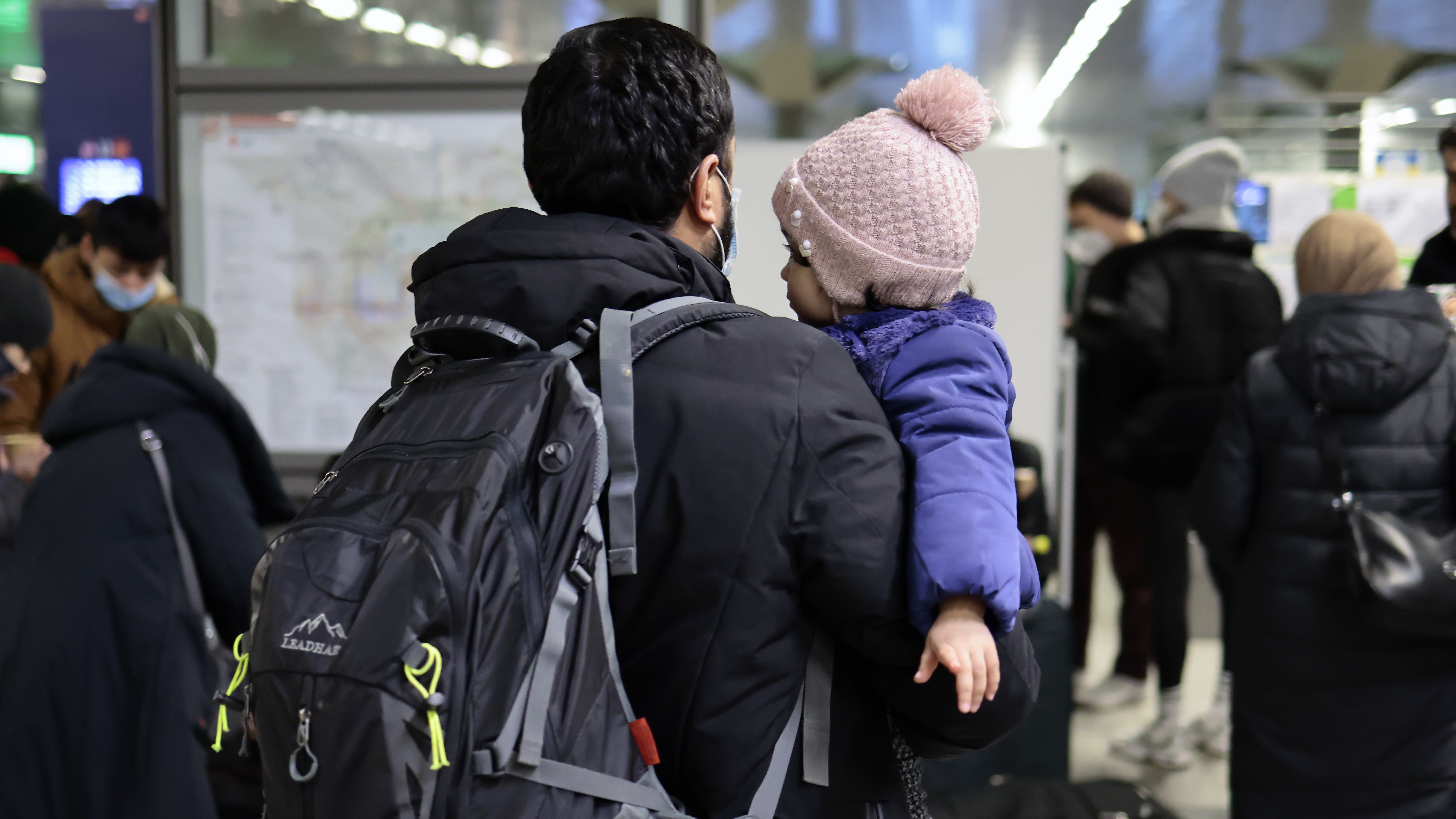How can people in the UK help Ukraine?
There are a range of practical ways to help the millions affected by war

A free daily email with the biggest news stories of the day – and the best features from TheWeek.com
You are now subscribed
Your newsletter sign-up was successful
As the humanitarian crisis unfolds in Ukraine, many people in the UK are looking for ways they can help the refugees fleeing the fighting and those who remain in the country.
Here are some practical steps you can take to help the Ukrainian people.
Turn down your thermostat
The Week
Escape your echo chamber. Get the facts behind the news, plus analysis from multiple perspectives.

Sign up for The Week's Free Newsletters
From our morning news briefing to a weekly Good News Newsletter, get the best of The Week delivered directly to your inbox.
From our morning news briefing to a weekly Good News Newsletter, get the best of The Week delivered directly to your inbox.
It may not sound like “much of a gesture” but turning down your thermostat by 1C is one of the few ways “ordinary people in Europe, and around the world” can have an impact, said The Guardian’s environment correspondent Fiona Harvey.
The global energy watchdog, the International Energy Agency, has produced a ten-point proposal showing how Europe could cut its consumption of Russian gas by about “about a third” through taking measures that include customers turning down their thermostats by just 1C from an average of 22C to 21C.
It is a change that “most people will barely notice” but could save Europe almost 10 billion cubic metres of the 155 billion imported annually from Russia, ultimately preventing money from “pouring into Russian coffers to fight the Kremlin’s war”, said Harvey.
Host Ukrainian refugees
A free daily email with the biggest news stories of the day – and the best features from TheWeek.com
Boris Johnson has said Britons will be able to open their homes to Ukrainian refugees under a new visa scheme, reported Sky News. Households will be offered £350 a month to host a refugee.
Housing secretary Michael Gove is due to set out details of a new “sponsored” humanitarian route to allow Ukrainians without family links to the UK to come to the country. The scheme will “include a hotline and webpage where individuals, charities, businesses and community groups will be able to offer rooms to those escaping the conflict”, said the broadcaster.
Refugees who enter through this new route are expected to be able to live and work in the UK for an initial 12-month period, and will be matched with those who have offered free accommodation.
Make a donation
Sean Ryan, media director of Save the Children, told the BBC that one of the best ways Britons can help is to “make a cash donation” to humanitarian charities.
He told the broadcaster that “collecting supplies like blankets or infant formula means transporting heavy goods hundreds of miles”. But “cash can reach people quickly to buy what is needed”, Ryan said.
Other organisations collecting funds for Ukraine include the British Red Cross, the UNHCR refugee agency, Unicef, the Disasters Emergency Committee (an umbrella group of 15 of the UK’s leading aid charities) and the Association of Ukrainians in Great Britain, the largest representative body for Ukrainians in the UK.
Many local initiatives are also being organised to collect items such as blankets, food and medicine to be sent over to Ukraine. The Ukrainian Social Club in Holland Park, west London, “has been accepting donations of clothes and medical supplies”, said The Times, and has “called for volunteers to help sort through and pack the items”.
Volunteer
The Refugee Council said people living in the UK can volunteer with its organisation to support refugees that arrive in the UK.
Local collection points may also be in need of volunteers to help take in and organise donations before they are sent abroad to Ukraine, said The Times.
But the Foreign Office advises against travelling to Ukraine, warning: “If you travel to eastern Ukraine to fight, or to assist others engaged in the conflict, your activities may amount to offences against UK terrorism or other legislation and you could be prosecuted on your return to the UK.”
-
 Putin’s shadow war
Putin’s shadow warFeature The Kremlin is waging a campaign of sabotage and subversion against Ukraine’s allies in the West
-
 Epstein files topple law CEO, roil UK government
Epstein files topple law CEO, roil UK governmentSpeed Read Peter Mandelson, Britain’s former ambassador to the US, is caught up in the scandal
-
 Iran and US prepare to meet after skirmishes
Iran and US prepare to meet after skirmishesSpeed Read The incident comes amid heightened tensions in the Middle East
-
 Israel retrieves final hostage’s body from Gaza
Israel retrieves final hostage’s body from GazaSpeed Read The 24-year-old police officer was killed during the initial Hamas attack
-
 China’s Xi targets top general in growing purge
China’s Xi targets top general in growing purgeSpeed Read Zhang Youxia is being investigated over ‘grave violations’ of the law
-
 Panama and Canada are negotiating over a crucial copper mine
Panama and Canada are negotiating over a crucial copper mineIn the Spotlight Panama is set to make a final decision on the mine this summer
-
 The rise of the spymaster: a ‘tectonic shift’ in Ukraine’s politics
The rise of the spymaster: a ‘tectonic shift’ in Ukraine’s politicsIn the Spotlight President Zelenskyy’s new chief of staff, former head of military intelligence Kyrylo Budanov, is widely viewed as a potential successor
-
 Why Greenland’s natural resources are nearly impossible to mine
Why Greenland’s natural resources are nearly impossible to mineThe Explainer The country’s natural landscape makes the task extremely difficult


